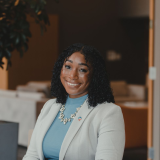Recognizing the Call to Allyship
Challenge the Inner Dialogue
Estimated read time: February 29, 2024
Have you ever found yourself in a situation where you experienced or observed something unsettling as either the target or bystander, yet you hesitated to intervene because you weren't sure how to approach it? Perhaps you felt that gut instinct urging you to speak up, but you struggled with questions like, "What should I say and how?" or "Is it my place to intervene?" If so, you're not alone.
This instinct is a call to allyship. Essentially, allyship involves actively speaking up and taking tangible steps towards support. It plays a crucial role in our daily interactions and experiences.
Personal Insights: Navigating Bias, Discrimination, and Allyship
Around 2 years ago, my husband and I settled into our neighborhood, which has since become our cherished home. Recently, we joyfully welcomed our second child into this community. One day, I took a stroll through our neighborhood with our baby to engage him before a car ride, a routine that usually ensures a smoother trip. Since it was Christmas time, I decided to show him the beautifully decorated homes and decorations, hoping it would calm him and adjust to being in his car seat. As we walked, my husband joined us, assisting me in loading the stroller into the car before we set off for our destination.
Later that evening, I noticed a WhatsApp post in our neighborhood group chat. A neighbor had posted an alarming message about seeing “two African Americans a guy and girl that came outside near the neighborhood Santa Clause picture, took a look and then left.” A slew of comments followed:
Post #1 … “I have no clue who they are, I hope we still have Christmas decorations tomorrow”
Post #2 … “I can’t believe someone would want to steal Christmas decorations”
Post #3 … “The robbers that broke into my aunts house a few blocks away drove a dark colored SUV could that be them?”
Post #4 … “Their car was a Sudan but they definitely look like they don’t belong here”
Post #5 … “Can we run their license plate”
Post #6 … “We should hide our Christmas decorations and install more cameras”
Post #7 … “Is there anything we can do about this?”
Post #8 … “We should all at the same time go outside and watch them so they know we are aware"
This encounter was both infuriating and disheartening to say the least. It never occurred to anyone involved that I could simply be a member of this community—a mother, a wife, someone cherished by their loved ones—rather than a threat, a robber seeking to steal Christmas decor.
As I reviewed the chat, I noticed just how quickly things escalated and felt gut punched at the reality of bias, prejudice and the fear that accompanies them.
In the span of just 20 minutes and 8 messages exchanged among neighbors, judgment, hysteria, and unnecessary panic prevailed, misrepresenting not only my own character but that of my entire family.
Responding to Bias and Discrimination
This incident left me unsettled and I knew that not only did I need to address the situation, but I wanted to speak up and express my desire to simply exist in my neighborhood in peace. After allowing myself to process my emotions, I resolved to address the situation directly, and respectfully stating:
“These comments are disheartening; unsettling and I do not appreciate them. My husband and I do in fact live here with our 2 children. I would encourage each of you to truly get to know your neighbors.”
Could I have expressed more? Certainly. Did I feel the urge to react angrily and let my frustrations out? Absolutely. However, I recognized that responding with anger and emotional impulsiveness wouldn't be constructive. In fact, it might worsen the situation and perpetuate the hostility and judgment that led to this offensive situation in the first place. The WhatsApp chat went radio silent until a neighbor, who hadn't previously participated, spoke up in defense, ultimately displaying a beautiful representation of allyship in practice. The text read:
“I agree with you Mariah! As a resident of this community for over 10 years, I’d like to apologize to you and your family for these ignorant comments and assumptions posted here on this chat board. I am often embarrassed at what I read on here, but I never say anything, which I think ends today. It isn’t right, and I think we as a neighborhood shouldn’t tolerate it. You, your husband, and your oldest son have been nothing but great neighbors. I was fortunate to get to know him while he befriended my kids at summer camp together. I hope to see you around.” - Ally Neighbor
Though I hadn't previously met this neighbor, he took the time to express empathy for my situation, encourage others to reevaluate their assumptions, and work towards resolving the issue. His actions meant a great deal to me. Moreover, his courageous stance inspired others to speak up, either echoing his sentiments or offering apologies and acknowledging their mistakes and biases.
Embracing Allyship as a Journey
Being an ally necessitates acknowledging and understanding one's own privilege, whether it stems from race, gender, sexuality, ability, or any other aspect of diversity, and leveraging that privilege to amplify the voices of those who have historically been marginalized or treated unfairly in comparison to more privileged members of society.
I understand that speaking up can feel daunting. What should you say? Is it your place to intervene? While there's no one-size-fits-all approach, in a time like this, I’m offering you a way to work through what you might feel when you’re in a situation that doesn’t sit right with you so you can ACT in a way that is not only what’s needed but that also feels right to you.
ACT
A: Ask questions! Practice empathy by asking yourself a few questions:
- What was the impact for them?
- What do they need right now?
- What can you reasonably give?
This allows everyone to pause and reflect. It gives you the chance to gather context and understand the situation fully. For the person speaking up it's an opportunity to consider the other person’s words and intentions.
C: Consider the necessary outcomes.
- How can you support the person harmed?
- How might you redirect the person who caused harm?
Knowing the desired outcome can help determine the most effective approach. Sometimes, calling someone in privately allows them to process their thoughts without public embarrassment. Again, shame helps no one. However, when harm is done publicly, addressing it publicly may be necessary to set community standards and ensure a tone is set for what the community will and won’t stand for.
T: Take action, considering feasibility.
While your instincts may guide you towards what you believe should or shouldn't occur — and you might be correct — some of these actions may be beyond reach or outside of ability in the moment. Redirect your focus towards what truly needs to happen vs. what can or should happen. Whether it's crafting a response, speaking to those involved, or reaching out to the person harmed, taking that first step is crucial and often, this can be the hardest part.
An Ongoing Commitment
Overall, allyship in everyday interaction requires a commitment to ongoing self-reflection, learning, and action to create a more inclusive and equitable society. That’s a hard, sometimes scary task. But the more we practice, the more we live as an ally the more we’ll be comfortable with speaking up and out to build the communities we want to see and aspire to live in.


